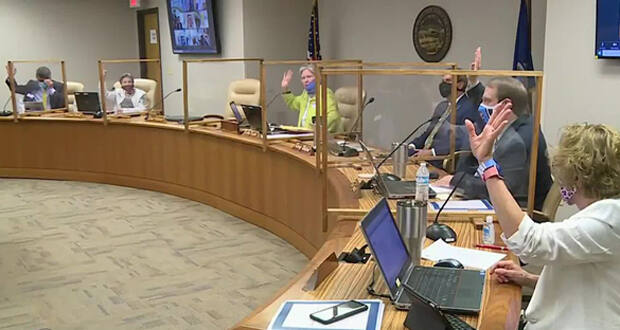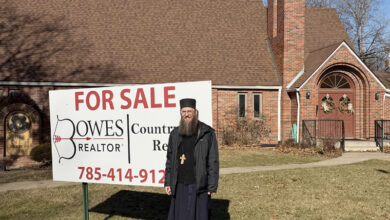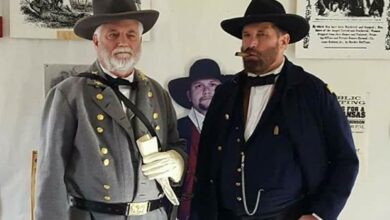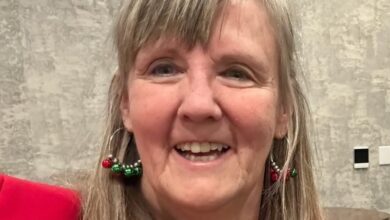KSBE rejects Gov. Kelly’s school reopening plan

Kansas’ elementary, middle and high schools will be able to reopen for in-person instruction in August, despite Gov. Laura Kelly’s school reopening plan to delay the 2020-21 school year until after Labor Day.
The Kansas State Board of Education voted 5-5 Wednesday, July 22 — the tie being enough to reject Kelly’s executive order that would have delayed the start by three weeks. Her order, which affected instruction and all extracurriculars, needed the board’s approval. The decision puts school reopening decisions back into the hands of local school leaders.
“The districts have been preparing for this and they are prepared,” board member Michelle Dombrosky said. “This needs to be a local decision.”
Kelly also mandated this week through an executive order — one that didn’t need board approval — that students, staff and teachers must wear masks and use hand sanitizer at least hourly. Districts have been spending the summer months buying gallons of hand sanitizer and thousands of masks.
But Kelly’s school reopening order also requires that schools give everyone entering their buildings daily temperature checks. Demand for personal protective equipment has made it difficult to quickly obtain quality supplies, and districts must rely on new vendors still learning to make the needed supplies.
“We will really need to problem solve that to get that particular mandate in place,” Wichita Public Schools Superintendent Alicia Thompson said Tuesday at a KMUW Engage ICT panel.
Manhattan-Ogden Public Schools said it’ll be a close call getting deliveries in before the 2020-21 school year’s first bell.
It’s set to get the last of the 14,500 face masks it ordered Aug. 12 — the district’s first day of school.
The district’s bond and purchasing accountant Jamie Gregory said it hasn’t had trouble finding most of the equipment it needs, just that the timing is taking longer than usual.
READ: Millions in federal aid could be lost as one in three Kansas households has yet to fill out census
Changes to the school buildings
Districts also have to make physical changes to school buildings, changes that will cost hundreds of thousands of dollars. Some are putting in plexiglass on desks to function like sneeze guards at a buffet.
But it’s more than that: Districts must choose whether to cut off the flow to water fountains, install contactless water bottle refills or just give students their own fresh-filled water bottle each day. Some schools are updating their HVAC systems to better clean the air.
Federal coronavirus relief funding is available to use for the updates, and a few districts hope local counties will share some of their federal aid pie. But the schools will likely have to pay for the supplies themselves.
Beyond safety supplies, some superintendents say that a three-week delay would have been more useful for training teachers and thinking about what could happen in the fall — from needing to do some lessons online or once again completely shutting down in-person classes.
“The time that we need is really for teachers to sit down and really plan,” said Kay Lewis, the superintendent of USD 258 Humboldt in southeastern Kansas. “We need to take some time to be able to have some conversations.”
Local school boards can choose to delay their school reopening, regardless of the state board deciding not to do so statewide. But without a waiver approved by the state, districts will have to make up for lost instruction time by extending the school year into the summer or cutting short holiday breaks.
KSBE members voted as follows:
Voting FOR local control:
Steve Roberts, Republican (District 2)
Michelle Dombrosky, Republican (District 3)
Jean Clifford, Republican (District 5)
Deena Horst, Republican (District 6)
Ben Jones, Republican (District 7)
Voting AGAINST local control:
Kathy Busch, Republican (Chair, District 8)
Janet Waugh, Democrat (Vice Chair, District 1)
Ann Mah, Democrat (District 4)
Jim Porter, Republican (District 9)
Jim McNiece, Republican (District 10)
“I do believe we must ensure our schools are as safe and ready as possible when they open, and that students want and need to resume their education as soon as possible,” Clifford said. “I don’t doubt the severity and impact of this virus. But this virus is not the same across our state. It has affected different areas of our state in varying fashions. One area may be experiencing a significant outbreak, while another is experiencing no, or very low, case numbers.
Other opponents of the school reopening order stressed statements by health experts about the importance of in-school learning. Problems with keeping children at home include damage to mental and emotional health, lack of socialization, and more.
“Many of my emails mention student hunger, learning gaps, mental issues other problems that children are experiencing because they have not been in school for such a long time,” Horst said. “Obviously, the longer they are out of school, the greater those problems become. My belief is that we have to provide an immediate protection for those children whose lives are more negatively impacted by not being in school instead of not being impacted by the virus.”
According to Scott Gordon, General Counsel for the Kansas State Department of Education, the order says that non accredited schools, such as home school programs or early childhood development programs, are exempt from the order.
Other Guidelines
The State Board of Education unanimously approved 1,100 pages of guidance for the state’s 286 local public school boards last week, setting out what it considers best practices. But it stopped short of imposing a mandate, reflecting the state’s long tradition of allowing local boards to make decisions about operations.
The board recommended daily temperature checks for all teachers and staff as they enter school buildings, while Kelly’s rules include students in the requirement. The board mandated masks for all teachers, staff and middle and high school students, while Kelly is mandating masks for all students, exempting children under 5 who visit schools.
Kelly’s order does make exceptions to the mask rule for eating, people with medical conditions or disabilities that prevent wearing masks and activities for which it is “unsafe or impossible” to wear them.
“Where Kansas goes from here is up to each and every one of us,” she said. “We can still flatten the curve and slow the spread of this disease.”
Republicans also criticized what they called a “one-size fits all” approach of having statewide restrictions on businesses and public gathering. Kelly lifted such statewide restrictions on May 26, after weeks of pressure from GOP lawmakers.
Kelly’s critics note that only 1.4% of the state’s reported coronavirus hospitalizations and none of the reported COVID-19-related deaths are in children under 18.
Lee Hartman | Metro Voice
(Stephan Bisaha (ksnewsservice.org) contributed to this report)








